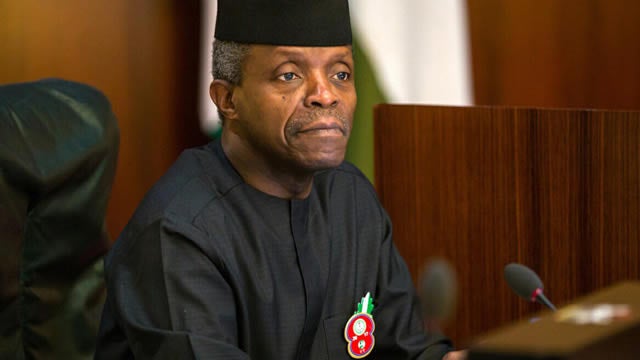The Vice President, Prof Yemi Osinbajo, has urged the manufacturing sector to be prepared for the fourth industrial revolution coming in the age of the Africa Continental Free Trade Area (AfCFTA).
Osinbajo, who was represented by Otunba Niyi Adebayo, Minister of Trade and Investment, gave the charge at the opening ceremony of the NIRAM/NME Expo 2020, on Tuesday, in Lagos.
The Expo, has as its theme: “The Fourth industrial Revolution and The Nigerian Manufacturing Sector.”
The Vice President said that the manufacturing sector was at the centre of the present administration’s strategy in attaining sustainable growth and lifting 100 million people out of poverty, over the next 10 years.
He noted that no other sector provided a stronger linkage to creating new jobs, improving value addition and creating wealth.
“We are at a crucial point in our economic history as a nation, after emerging from a recession.
“We have attained a reasonable measure of macroeconomic stability, with positive growth for more than two years.
“We stand on the brink of the fourth industrial revolution, a technological revolution that will fundamentally alter the way we live, work and relate with one another.
“Also, imminent is the emergence of the Africa Continental Free Trade Area (AfCFTA), an agreement that would change the positioning of the Nigerian market and the way trade is carried out in Africa,” he said.
The VP stated that the nation was ready to take advantage of the AfCFTA and the fourth industrial revolution changes, though some challenges remained.
“Though agriculture contributes 22 per cent to our GDP, we continue to face the challenge of meeting domestic food requirements, providing raw materials for the manufacturing sector and exporting at quantity and quality levels required for successful market participation.
“We know what must be done and we have agreed on what must be done.
“We must create good jobs and economic opportunities, and rapidly industrialise and build infrastructure gaps and provide the environment for businesses, small and large, to thrive.
“We know we must ramp up our agricultural production and provide a more efficient farm, to market value chain, which will again create millions of jobs in farming and agribusiness.
“We must also improve the patronage of locally made goods, bridge the gap in industrial skills and innovation, address the cost and access to finance, and resolve multiple taxation amongst others,” he said.
On the fourth industrial revolution, the VP noted that the possibility of billions of people connected by mobile devices, with unprecedented processing power, storage capacity and access to knowledge; were unlimited.
“And these possibilities will be multiplied by emerging technology breakthrough in fields like artificial intelligence, robotics, autonomous vehicle, 3-D printing.
“Nigerians are the second largest users of mobile phones; about 117 million at the last count, so this disruption to traditional industries, is inevitable.
“Mr President’s signing of the AfCFTA presents great opportunities to the manufacturing sector.
“We have an opportunity to expand our reach across Africa, where we are already exporting commodities such as fast moving consumer goods, cement and even Fintech,” he said.
Meanwhile, the manager of Trade and Finance Afrexim Bank, Mr Remmy Nwachukwu, revealed that Africa’s growth fundamentals were improving.
Nwachukwu attributed the improvement to the gradual shift from private consumption toward investment and exports.
He said that business-to-business spending in manufacturing, projected to reach $66.3 billion by 2030, should position the continent to be the world’s next great manufacturing centre.
“The historic entry into force of the AfCFTA builds on positive economic trends and will no doubt catalyze the transformation of the continent.
“The AfCFTA is a game changer which would end the fragmentation of the continent, thereby paving way for the establishment of a single market of 1.2 billion people and a GDP of $2.5 trillion, which is vital for promoting intra-African trade and industrialisation.
“To understand the magnitude of the market size created by the AfCFTA, if Africa is treated as a single economy, it would rank number 8, in terms of global GDP, just behind the United Kingdom, but above Italy.
“Intra-African trade is expected to increase by 52.3 per cent by 2022, and more than double within the first decade of implementation, if the implementation of the AfCFTA is accompanied by robust trade facilitation measures.
“For example, annual food imports within the continent stand at $35 billion, and with the AfCFTA, the agribusiness is expected to be $1 trillion by 2030.
“Furthermore, the size of the manufacturing output is expected to be $1 trillion by 2025 and about 1.6 billion will need clothing by 2030,” he said.
Against this backdrop, the Afrexim Bank Manager, said that the bank would continue to implement its IMPACT 2021: Africa transformed Strategy.
He explained that IMPACT 2021, was premised on four Strategic Pillars namely: promoting Intra-African Trade, facilitating Industrialisation and Export Manufacturing, strengthening African Trade Finance Leadership and improving Financial Soundness and Performance.
On the Intra-African Trade Fair (IATF) scheduled to hold from Sept. 1-7, 2020, in Kigali, Rwanda, Nwachukwu stated that the bank has decided to make it a “Go-to Show” for the creative economy.
“The key sectors include fashion, film, music, arts and craft and the bank’s interventions will include financing, capacity building, export development, clustering and linkages, digital trade and E-Commerce and policy advocacy.
“The goal is to provide 500 African banks access to trade services and about 8 billion in trade financing by 2021,” he said.




